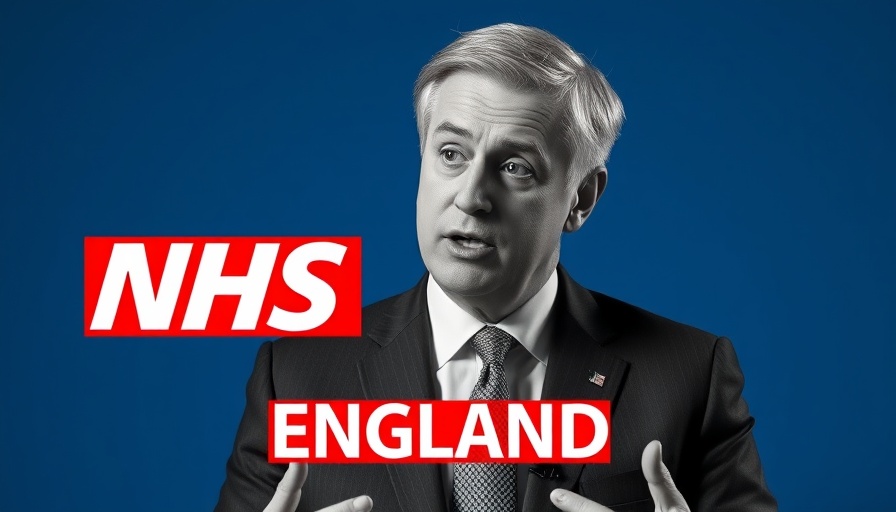
Navigating Change: The Future of the NHS Under Wes Streeting
The recent announcement from Health Secretary Wes Streeting regarding the restructuring of NHS England has stirred considerable debate. This dramatic overhaul, which involves the abolition of NHS England and its functions being absorbed into the Department of Health and Social Care (DHSC), aims to save an estimated £500 million while cutting approximately 10,000 jobs. As Streeting argues, this bold move is meant to streamline operations and free up more resources for frontline care, yet it raises significant concerns about the immediate future of healthcare delivery across England.
Understanding the Stakes of NHS Reform
One of the main talking points of Streeting’s announcement is his assertion that the current NHS management structure has led to unnecessary bureaucracy that diverts attention from critical patient care issues like lengthy wait times. Experts, however, have expressed skepticism that simply eliminating NHS England will effectively tackle these underlying problems. The British Medical Association (BMA) warned that restructuring could detract from essential tasks such as addressing an ongoing workforce crisis and the management of patient care pathways.
A Bold Move or a Risky Gamble?
The impending changes to NHS governance hint at a significant shift in how healthcare will be managed. According to sources within the government, there is a sense of urgency to empower local healthcare facilities. Streeting believes that by handing over greater control to local providers, health services can innovate and adapt more efficiently to community needs. However, this may not be as straightforward as it sounds. The transfer of responsibilities could prove labor-intensive and lead to a period of instability as institutions adjust to their new roles.
Simplifying Overheads: Underlying Motivations
While proponents of the changes emphasize cost savings as a primary motivator, deeper issues lurk beneath the surface. Critics argue that the restructuring of NHS England reflects a top-down approach that does not adequately address the complexity and varied needs of the UK's healthcare system. As a former health minister pointed out, meaningful reforms may require more than just slashing jobs or cutting overhead; they necessitate long-term strategies aimed at patient care improvement and responsiveness to local needs.
A Historical Perspective: Learning from Past Mistakes
There’s a rich history behind NHS England’s formation and operational missteps. Established in 2012 as part of what was called the Lansley reforms, NHS England initially sought to deliver a more streamlined, independent health service devoid of day-to-day political interference. However, the reality of its expansion over the years, ultimately winding up as the "world’s biggest quango," is a cautionary tale against excessive centralization. Reflecting on this evolution raises questions about whether the proposed changes can genuinely foster a more effective and efficient NHS.
The Role of Stakeholders: Voices of Concern
The reorganization has not only alarmed healthcare providers but also drawn concern from unions representing NHS staff. For many, the abrupt changes have left employees feeling insecure and uncertain about their future in the health sector. Organizations like Unison and the BMA have highlighted the emotional and professional toll that such sweeping job cuts can impose on an already stressed workforce, reminding decision-makers of the human element in this high-stakes game of administrative chess.
Future Predictions: Where Do We Go from Here?
As the government presses forward with its ambitious plans, speculation abounds regarding the practical implications of this dramatic shift. Will we see improvements in patient care, or are these changes merely cosmetic, aimed at meeting budgetary pressures without genuinely addressing the systemic issues at play? The plans for dismantling NHS England are poised to unfold against a backdrop of growing public concern about waiting times and healthcare quality, making the coming months crucial for demonstrating the promised impact of these reforms.
Conclusion: A Call for Clarity and Compassion
As these structural changes to NHS governance loom on the horizon, it is paramount that the government remains transparent about its aims and alternatives available. The healthcare system, with its deep roots, requires careful consideration of both the implications for patient care and the well-being of healthcare professionals tasked with delivering it. Only through a balanced approach can the NHS hope to navigate these turbulent waters successfully.
The reforms proposed by Wes Streeting have sparked a necessary conversation about the future of the NHS. Stay informed about upcoming developments and how they might affect our healthcare landscape.
 Add Row
Add Row  Add
Add 



Write A Comment